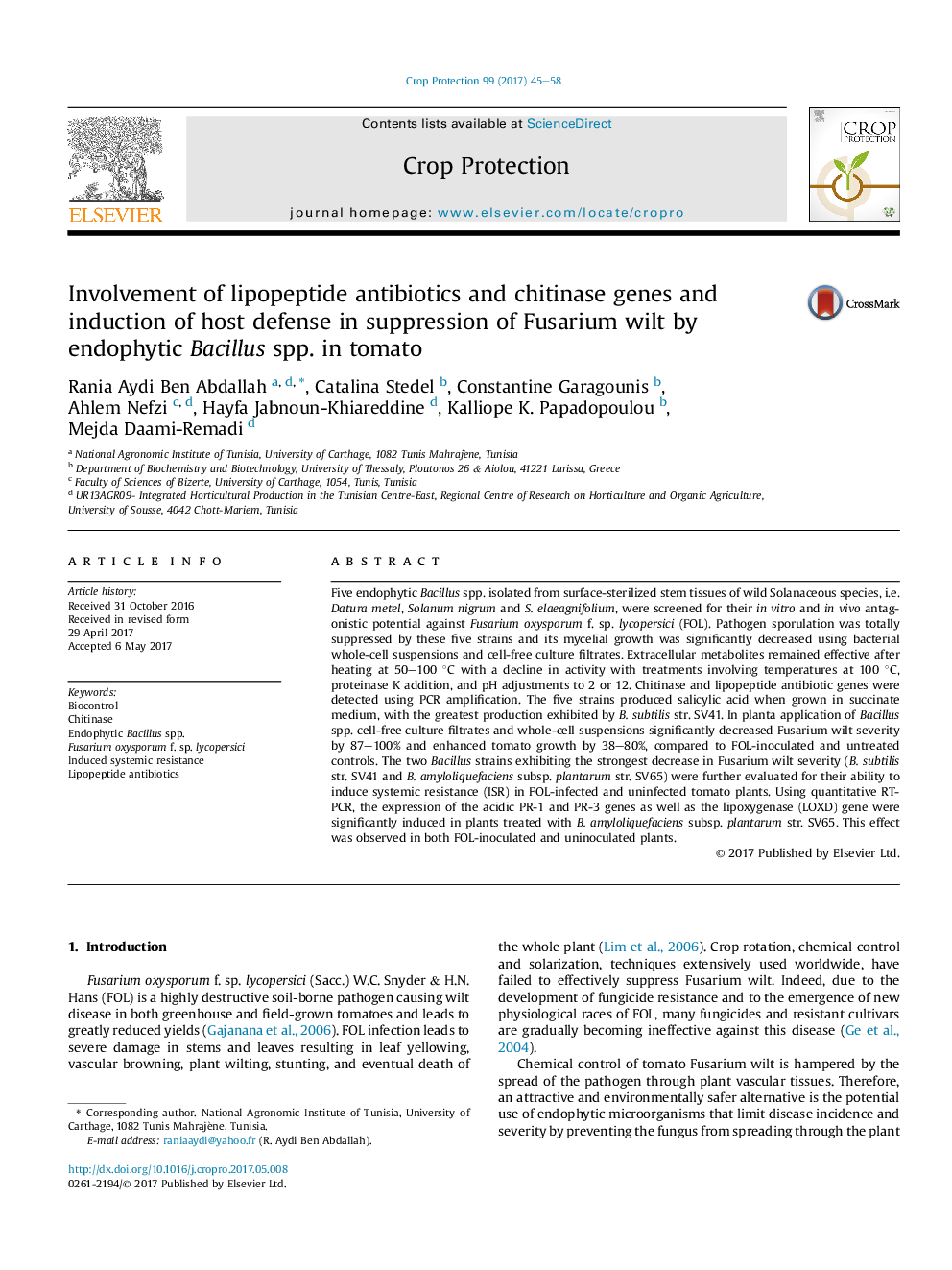| کد مقاله | کد نشریه | سال انتشار | مقاله انگلیسی | نسخه تمام متن |
|---|---|---|---|---|
| 5761033 | 1624288 | 2017 | 14 صفحه PDF | دانلود رایگان |
عنوان انگلیسی مقاله ISI
Involvement of lipopeptide antibiotics and chitinase genes and induction of host defense in suppression of Fusarium wilt by endophytic Bacillus spp. in tomato
دانلود مقاله + سفارش ترجمه
دانلود مقاله ISI انگلیسی
رایگان برای ایرانیان
کلمات کلیدی
موضوعات مرتبط
علوم زیستی و بیوفناوری
علوم کشاورزی و بیولوژیک
علوم زراعت و اصلاح نباتات
پیش نمایش صفحه اول مقاله

چکیده انگلیسی
Five endophytic Bacillus spp. isolated from surface-sterilized stem tissues of wild Solanaceous species, i.e. Datura metel, Solanum nigrum and S. elaeagnifolium, were screened for their in vitro and in vivo antagonistic potential against Fusarium oxysporum f. sp. lycopersici (FOL). Pathogen sporulation was totally suppressed by these five strains and its mycelial growth was significantly decreased using bacterial whole-cell suspensions and cell-free culture filtrates. Extracellular metabolites remained effective after heating at 50-100 °C with a decline in activity with treatments involving temperatures at 100 °C, proteinase K addition, and pH adjustments to 2 or 12. Chitinase and lipopeptide antibiotic genes were detected using PCR amplification. The five strains produced salicylic acid when grown in succinate medium, with the greatest production exhibited by B. subtilis str. SV41. In planta application of Bacillus spp. cell-free culture filtrates and whole-cell suspensions significantly decreased Fusarium wilt severity by 87-100% and enhanced tomato growth by 38-80%, compared to FOL-inoculated and untreated controls. The two Bacillus strains exhibiting the strongest decrease in Fusarium wilt severity (B. subtilis str. SV41 and B. amyloliquefaciens subsp. plantarum str. SV65) were further evaluated for their ability to induce systemic resistance (ISR) in FOL-infected and uninfected tomato plants. Using quantitative RT-PCR, the expression of the acidic PR-1 and PR-3 genes as well as the lipoxygenase (LOXD) gene were significantly induced in plants treated with B. amyloliquefaciens subsp. plantarum str. SV65. This effect was observed in both FOL-inoculated and uninoculated plants.
ناشر
Database: Elsevier - ScienceDirect (ساینس دایرکت)
Journal: Crop Protection - Volume 99, September 2017, Pages 45-58
Journal: Crop Protection - Volume 99, September 2017, Pages 45-58
نویسندگان
Rania Aydi Ben Abdallah, Catalina Stedel, Constantine Garagounis, Ahlem Nefzi, Hayfa Jabnoun-Khiareddine, Kalliope K. Papadopoulou, Mejda Daami-Remadi,